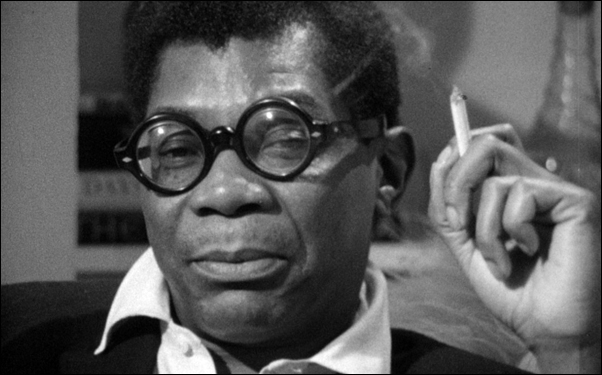At first glance, the restoration of “Portrait of Jason” might not seem like the usual suspect for a Kickstarter campaign. After all, in a sea of aspiring filmmakers looking to get their first features off the ground, how exciting would it possibly be to invest in a movie from the 1960s? But that is something Dennis Doros and Amy Heller of Milestone Films would like to clarify, just as the two are quite literally doing with the dirt and scratches that have affixed themselves onto Shirley Clarke’s electrifying documentary of a young, gay African-American hustler named Jason Holliday.
A project that has already earned the stamp of approval from the New York Film Critics Society, which may have taken five hours on Monday to crown a best picture winner, but considerably less to bestow a special award to Milestone for their efforts over the past few years to restore “Jason” to its original glory, it still needs one final push before a December 10th deadline to join the company’s other important and intricately revitalized editions of Clarke’s other works “The Connection” and “Ornette: Made in America” in being protected against the further desecration of time.
Time has already had its way with the original print of “Portrait of Jason” — the masters were lost long ago, necessitating a two-year search that resulted in the discovery of a collection of what were thought to be outtakes but were actually an original fine-grain version of the Clarke’s initial cut of the film, which is now the basis for the new restoration. However, the same can’t be said for Clarke’s body of work in general, which has only grown more revelatory in the years since she stopped making films in 1985. In some ways, the filmmaker was even a discovery for Milestone, the New Jersey-based company that has been held in great esteem by cinephiles since their inception in 1990 by restoring an releasing some of cinema’s great underseen works from Mikhail Kalatozov’s “I Am Cuba” to Luchino Visconti’s neorealist masterpiece “Rocco and His Brothers,” films that Doros likes to describe as “our version of outsider art – forgotten by historians, critics, academics and fans and influence what future cinema history will look like.”
After Doros and Heller began putting together rereleases for Lionel Rogosin’s “On the Bowery” and “Come Back, Africa” and Charles Burnett’s “Killer of Sheep,” all films where the mix of realism and documentary now feel even richer and more raw than when they were first released, they soon turned their attention towards Clarke. An American indie filmmaker who was a bridge between Rogosin and Burnett, Clarke’s films during the ’60s often offered a rare glimpse of the dark corners of society in uncompromising terms, whether it was the Harlem gangs of 1964’s “The Cool World” (a real rarity since producer Frederick Wiseman has yet to release the film on DVD) or in “The Connection,” the adaptation of Jack Gelber’s tale of heroin addicts waiting for their fix, which was the first fruit of Milestone’s overall four-year effort to bring Clarke’s work back to the big screen. Early notices for their work on Rogosin and Burnett’s films spurred Doros and Heller on.
“Our releases were becoming part of the cinema zeitgeist with the article in the New York Times Sunday Magazine by A.O. Scott, the follow-up articles in the New Yorker by Richard Brody, and new filmmakers taking up the mantle like Matt Porterfield,” Doros said recently in an e-mail. “What better way to explore this of cinema of poetic truth, than releasing the films of the director, Shirley Clarke, who in her films impishly blew apart the defining lines between the cinema vérité of her good friends —Pennebaker, Drew and the others — and the Hollywood narratives she loved growing up?”
Up until now, the Clarke restorations have followed the trajectory of most Hollywood narratives, with Milestone producing and distributing sterling releases of “The Connection” and “Ornette: Made in America,” which will open at the New Beverly Cinema in Los Angeles this Friday as part of a national run. Yet with mounting costs and limited time, the company, whose decision to pay all costs associated with their previous releases has been a point of pride, decided to look to the crowd with the hope of getting “Portrait of Jason” into theaters next year, kicking off with a debut at the Berlin Film Festival in February. Should the Kickstarter campaign be successful, New Yorkers can expect a run at the IFC Center in the spring and an international run to follow en route to a Blu-ray/DVD release that promises to live up to Milestone’s previous Criterion Collection-level standards. In the mean time, Doros hopes that “Portrait of Jason” doesn’t just kickstart his own project, but many other film restoration efforts as well.
“Having contributed to some friends’ projects on Kickstarter, including our close friend Anne Aghion’s Iriba Center in Rwanda: A Media Archive to Remember History, we thought we should give it a try,” said Doros. “Since our posting, the Outfest Legacy Project did do a shorter term Kickstarter to raise money for ‘Different From the Others,’ a wonderful early LGBT silent film from Germany. I do hope others will try because win or lose, I think it’s energized a lot of individuals to realize that they themselves can help preserve our film culture.”
To back this project and see Doros and Heller’s personal pitch video, check out the film’s Kickstarter page here. And follow the progress of “Portrait of Jason” and Milestone’s other work at their official site, Twitter and Facebook.




